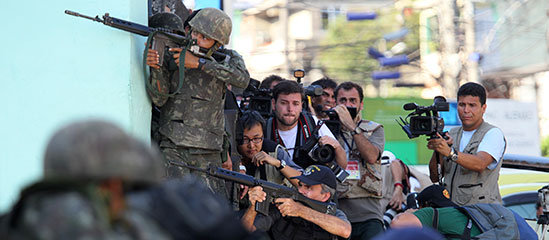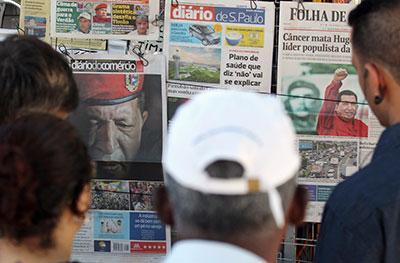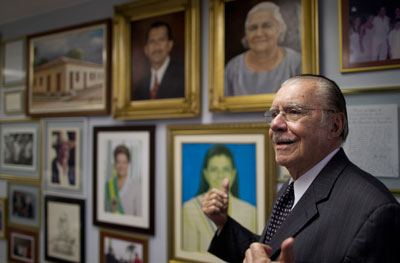3. Censorship via the courts
By John Otis
Published since 1824 in the Brazilian city Recife in northeastern Pernambuco State, Diario de Pernambuco is South America’s oldest daily newspaper still in circulation. Over its 190 years the paper butted heads with the powerful and was censored by Brazil’s military regimes. But last year Diario de Pernambuco suffered its first case of official censorship since Brazil returned to democracy in 1985.

In August 2013 the paper broke the news that Guilherme Uchoa, the president of the Pernambuco state legislature, was the subject of an influence-peddling investigation. He was accused by state prosecutors of pulling strings on behalf of his daughter, a lawyer who was trying to help her client fast-track the process of adopting a child. Uchoa denied the charges and was found not guilty.
HALFTIME FOR THE
BRAZILIAN PRESS
• Table of Contents
In print
• Download the pdf
In other languages
• Português
News of the investigation, though, was a major scoop that produced a frenzy of coverage in the Recife media. Then Uchoa’s name suddenly disappeared from the stories. Arguing that his name and image were being unduly harmed, Uchoa persuaded a local judge to bar Diario de Pernambuco, its sister TV station, and the crosstown rival Jornal do Commercio newspaper from linking Uchoa’s name to the investigation. The judge warned that for every day these media outlets ignored the injunction, they would be fined about $21,500.
The injunction was lifted after a week, but the forced silence was disconcerting. Surrounded by reporters and copy editors in the cramped second-floor newsroom, Paulo Goethe, the executive editor of Diario de Pernambuco, told CPJ, “This is a very sophisticated way to pressure the media.”
Known as judicial censorship, such legal actions amount to a crafty end-run around Brazil’s Constitution. Even though the 1988 Constitution guarantees freedom of the press and outlaws censorship, politicians, business people, and celebrities have used laws intended to guarantee the privacy of average citizens to silence the media.
Often relying on their close connections to local judges, these powerbrokers have secured legal orders that effectively prevent or discourage critical reporting by making it extremely costly for media outlets and independent journalists to publish unflattering stories about them. In some cases, libel is not the issue. Rather than contesting the details of published reports, these public figures try to prevent the news from appearing in the first place on the grounds that their privacy is being invaded and their honor besmirched.
Judicial censorship is widely considered the second biggest problem facing the media in Brazil after violence against journalists. The targets of judicial censorship range from major metropolitan dailies and Internet companies like Google to independent bloggers in remote towns. Because television is in real time and Brazilian stations post only a fraction of their news videos online, they have largely avoided judicial censorship, although there have been a few cases.
Unable to pay the legal costs of defending themselves in court, newspapers have backed away from controversial stories while some independent news bloggers have stopped writing, said Taís Gasparian, a São Paulo lawyer who often defends journalists.
In an interview with CPJ, Ricardo Pedreira, executive director of the Brasília-based National Association of Newspapers, said that judicial censorship “is totally unconstitutional. It hurts Brazilian society because people are not getting all the information that they should be.”
Since 2005, the newspaper association has registered 25 instances of judicial censorship. That number does not include the thousands of links to critical media stories or YouTube videos that Google Brazil and UOL, the largest Brazilian Internet company and news portal, have been ordered by judges to eliminate. YouTube is owned by Google.
Many cases of judicial censorship are reversed, in part, because appeals court judges often have higher levels of education than small-town magistrates and lack personal ties to the political figures filing the lawsuits, Pedreira said. But the appeals process is costly and can take months—or years—and by then the news has been censored.
During Brazil’s 2012 municipal elections, for example, judges in several towns intervened on behalf of political candidates to prevent newspapers from publishing polls suggesting those candidates were losing. By the time the initial decisions were overturned, the polls were out of date, said Guilherme Alpendre, executive secretary of the Brazilian Association of Investigative Journalism, or ABRAJI.

Alpendre said he considered judicial censorship more sinister than the crackdowns on the news media during the nation’s 21-year military dictatorship.
“During the dictatorship, a censor would sit in at editorial meetings and say ‘no’ to this story or ‘yes’ to that story,” Alpendre told CPJ. “But what’s going on now is worse because it exists within Brazil’s democracy.”
Prominent members of the Brazilian judiciary play down the threat.
Chief Justice Joaquim Barbosa, and one of his predecessors, Antonio Cesar Peluso, have both told CPJ that cases of judicial censorship are rare, that many decisions are overturned on appeal, and that the issue does not constitute a serious threat to freedom of expression.
“Prior censorship is bad, it is illegal, and unfortunately there are those who make mistakes, and that is what’s happening in Brazil. These specific cases of censorship are inadvertent mistakes committed by some judges,” Barbosa said during an international conference on investigative journalism in Brazil in late 2013. He did not respond to CPJ’s recent request for comment.
Legal experts blame several factors for the rise of judicial censorship. After the country’s return to democracy in 1985, citizens felt more empowered to defend their rights and, as a whole, Brazil became a more litigious society. In the words of Gasparian: “Everybody began to sue everybody.”
In addition, Brazil’s 2002 Civil Code contains four ambiguous articles that protect privacy but clash head-on with the Constitution’s declaration of free speech.
For instance, Article 17 of the Civil Code prohibits the dissemination of personal information that can “damage the honor” of an individual. Unlike in the United States, where the Supreme Court has determined that public officials carry a high burden of proof in cases alleging defamation or libel, Brazil’s judiciary has set no such standard. As a result, politicians in Brazil have leveraged the privacy articles to muzzle free expression.
So have the rich and famous, which has led to an effective ban on the publication in Brazil of unauthorized biographies. The best-known lawsuit was filed in 2007 by the Brazilian crooner Roberto Carlos who, alleging that his privacy had been violated under Articles 20 and 21 of the Civil Code, forced a publisher to remove an unauthorized biography from bookstores. Author Paulo Cesar de Araújo had spent 15 years working on the book.
Many legal scholars argue that the privacy articles in the Civil Code are unconstitutional. But despite continuing challenges to the legality of the four articles, they remain in effect and are often invoked by judges when ruling on behalf of plaintiffs in cases against journalists.
The most prominent and longest-lasting case involves a dispute between the family of José Sarney, a former Brazilian president who is now an influential senator, and the newspaper O Estado de São Paulo. In 2009, O Estado began publishing articles—based in part on leaked transcripts from phone conversations that were tapped during a federal investigation—alleging that Sarney used his position in the Senate to award jobs and give raises to his friends and family. Through his lawyers and in a statement on his website, Sarney denied the allegations.
The Sarneys reached out to a judge in Brasília, a family friend who had recently been photographed at a lavish party with the Sarneys, according to Ricardo Gandour, chief content officer and executive editor of the Estado Group, which owns the newspaper. Based on Article 17 of the Civil Code, the judge issued an injunction barring O Estado from publishing any more reports about the allegations or face a daily fine of 150,000 reals, or about $64,000 at the current exchange rate. More than four years later, O Estado’s final appeal is still pending and the injunction remains in place.
“We are fighting the case but have to respect the law,” Gandour told CPJ. Brazil’s judiciary, he added, “is becoming disproportionately powerful compared to other branches of government.”

In some cases, other news outlets have been allowed to report on topics banned elsewhere, such as with the Sarney case and after Diario de Pernambuco was muzzled. But the possibility of being slapped with a fine or gag order is often enough to keep competing outlets quiet.
Even when media companies win in court, they lose in other ways because these legal battles can be expensive, drawn-out ordeals.
Take the 2007 case of Folha de São Paulo, which published an investigation written by Elvira Lobato about the growing business empire of the Rio de Janeiro-based Universal Church of the Kingdom of God. Lobato’s article claimed the church, a neo-Pentecostal movement, used a company in a tax haven to channel contributions from followers to 19 businesses owned by the church, which include television and radio stations, newspapers, travel agencies, and real estate.
The church denied this allegation and, at its urging, its parishioners all over Brazil filed 109 civil defamation lawsuits against Lobato, claiming she had offended their faith. The church’s strategy amounted to a legal war of attrition. The idea was to file so many lawsuits in so many towns that it would be impossible for Lobato to contest them all.
Lobato and Folha’s lawyers had to travel thousands of miles to make mandatory court appearance in towns as far away as Xapuri near Brazil’s western border with Peru—some 2,500 miles from the reporter’s home in Rio de Janeiro. So far, 97 of the suits have been thrown out while the rest are pending. But the newspaper spent huge sums on airfare, hotels, and legal fees.
“It was a hellish experience,” Lobato told CPJ.
Smaller papers and independent journalists, she pointed out, lack the financial muscle to fight judicial censorship.
One such journalist is São Paulo blogger Fábio Pannunzio. He worked for 30 years as a radio and TV reporter and was sued only once. But as the author of Blog do Pannunzio, which often denounced government corruption, he was sued eight times in four years. Facing huge legal defense fees, he shut down the blog in 2012.
“As a blogger, I wrote similar accusations to those I would say on television, but I was sued as an individual,” Pannunzio told the Knight Center for Journalism in the Americas at the University of Texas shortly after shutting down his blog. “The figures I was denouncing did not want to take on a big broadcaster with a big business infrastructure. They wanted to target who they thought was most vulnerable to censorship.”
Although independent journalists may be easier targets for judicial censorship, public figures are not afraid to go after large media companies and Internet giants, like Google.
Every week, Google Brazil receives orders from judges around the country to remove from its search engine links to news stories deemed offensive to politicians and other public figures. The company has also been ordered to remove videos from YouTube and to turn over to the police information about people who uploaded the content, who could then be investigated for offending or defaming public officials.
In Google’s latest transparency report covering the first half of 2013, the company said it had received orders from Brazilian judges to remove about 400 blog posts and links. Though the number of court orders is down from the same period a year earlier, it remains much higher than the number of similar orders Google received in most other countries.
Google’s lawyers contest the cases but often lose. Marcel Leonardi, Google Brazil’s director for public policy, told CPJ that the company goes to great lengths to avoid turning over data to government authorities. Google’s legal team reviews each government request for user data and pushes back when the requests are overly broad or don’t follow the correct process, he said.
“Freedom of expression is dear to us,” he said, “The free flow of information is essential to creativity and innovation, and leads to economic growth for countries and companies alike.”
Rodrigo Flores, director of content for UOL, said his company receives similar orders about once a month and that they “create an environment of fear.” Most orders are initiated by politicians seeking to remove links to news stories detailing charges of corruption or other wrongdoing.
“They sincerely believe that they can erase history,” Flores said.
But for some legal experts, a strong case can be made for erasing story links, especially if they are out of date and inaccurate.
Augusto de Arruda Botelho is president of a lawyers’ collective in São Paulo, known as IDDD, that supports the rights of Brazilians to defend themselves. He told CPJ that it’s only fair for search engines and news websites to eliminate links to stories about accusations that made a big splash in the press but later turned out to be unfounded.
He also blames journalists for instinctively jumping on lurid allegations but failing to publish follow-up stories when charges are dropped or defendants are found not guilty. “Many times reporters ignore the journalistic principle of giving the other side of the story,” he said.
Arruda Botelho says he’s no fan of politicians who invoke privacy laws to derail journalistic investigations of wrongdoing. But at the same time he vigorously defended the right of public figures to go before a judge and ask for an injunction.
“I think it is everybody’s right to knock on the court’s door to say: ‘I think my rights are not being observed,’” he said. “Even public officials must be presumed innocent.”
Their efforts to booby trap journalists sometimes backfire.
During the court-ordered injunction against the media in Recife, subsequent news articles—while omitting Uchoa’s name—included so many other key details about the politician that readers could easily identify him. Uchoa received blistering criticism in the national media and eventually backed down. The injunction was withdrawn, and Uchoa claimed it was all a big misunderstanding.
Goethe, of Diario de Pernambuco, hopes the blowback from the Uchoa case deters other politicians from going down the same legal pathway. But a few blocks away at Jornal do Commercio, the paper’s executive editor, Maria Luiza Borges, remains wary.
“Our politicians are arrogant,” Borges told CPJ. “They don’t admit to having faults. They don’t deal with negative stories in a democratic way.”
EDITOR’S NOTE: The ninth paragraph has been corrected to reflect that Ricardo Pedreira is executive director of the Brasília-based National Association of Newspapers, not president as previously stated.
John Otis, CPJ’s Andes correspondent for the Americas program, works as a correspondent for Time magazine and the Global Post. He authored the 2010 book Law of the Jungle, about U.S. military contractors kidnapped by Colombian rebels, and is based in Bogotá, Colombia.